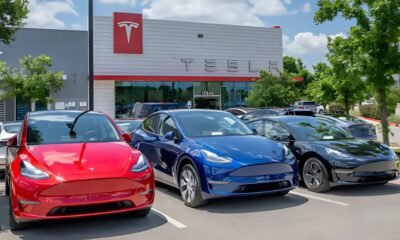Innovation
Huawei Positioned to Dominate China’s AI Market, Warns Nvidia CEO Jensen Huang

In the rapidly evolving landscape of artificial intelligence (AI) and semiconductor technology, Nvidia CEO Jensen Huang has issued a cautionary message: if the United States continues to restrict China’s access to advanced chips, companies like Huawei are poised to step in and dominate the Chinese market.
Speaking at the VivaTech conference in Paris, Huang emphasized the long-term risks of the U.S. limiting its involvement in China’s AI ecosystem. “If the United States doesn’t want to partake in China, Huawei has got China covered—and Huawei has got everybody else covered,” Huang said in a CNBC interview.
Huawei’s Rapid Rise in a Restricted Market
Huawei, a Chinese tech titan that once primarily focused on telecommunications, is now emerging as a major force in AI chip development. Despite U.S. export curbs that block Chinese firms from accessing Nvidia’s latest semiconductors, Huawei has made significant progress in building its own ecosystem.
While Huang confidently stated, “Our technology is a generation ahead of theirs,” he also acknowledged the strategic efforts of Beijing to bolster domestic champions. The Chinese government has prioritized AI and semiconductors as critical industries and is heavily investing in companies like Huawei to develop self-reliant technologies.
Ironically, Huawei’s own CEO Ren Zhengfei took a humble stance earlier this week, telling the People’s Daily newspaper that “Huawei is not that great. We have to work hard to reach [the U.S.] evaluation.” Still, global analysts warn that the rapid pace of Chinese innovation should not be underestimated.

U.S. vs. China: The Battle of AI Ecosystems
Huang underscored the importance of the global AI community aligning with the “American technology stack,” including Nvidia’s own hardware and platforms. The CEO believes it’s critical for U.S. technology companies to stay engaged with the Chinese AI developer community to maintain influence.
“If we want the American technology stack to win around the world, then giving up 50% of the world’s AI researchers is not sensible,” Huang argued. “So long as all the AI developers are in China, I think the China stack is going to win.”
This statement highlights a dilemma the U.S. faces: balancing national security and trade policy without alienating a large segment of global AI innovation.
Geopolitical Tensions Escalating
The semiconductor industry has become the center of a larger geopolitical tug-of-war between the United States and China. Recently, the U.S. announced it would aggressively revoke visas for Chinese students, especially those studying in sensitive fields like chip design and quantum computing.
Meanwhile, the Biden administration has tightened export controls and urged U.S. firms not to use Chinese-made chips, further isolating Chinese tech players. China, in turn, has criticized these actions as efforts to stifle its technological rise and accused the U.S. of undermining free trade.
Nvidia’s Global Strategy: From China to Europe
Despite the U.S.–China standoff, Huang has been actively expanding Nvidia’s global footprint, particularly in Europe. Earlier in the week, he praised the United Kingdom for having “one of the richest AI communities anywhere on the planet.” He also promised new investments to support AI research and development in the region.
In his remarks about France, Huang noted the country’s potential to become an “AI exporter,” much like it currently exports energy. “All the pieces of the puzzle are here. You’ve got to take advantage of it,” he said, adding that Europe can stand independently from both China and the United States in the AI race.
He further elaborated that intelligence, powered by AI, would be the “foundational layer” of every industry. Thus, he believes the EU will become a massive market for AI technologies rivaling the scale of its GDP.
Looking Ahead: Strategic Caution Amid Innovation
Huang’s comments serve as both a warning and a roadmap. While Nvidia may currently lead in AI hardware, including GPUs critical for training large language models, it recognizes the potential fallout of geopolitical decisions. The CEO’s tone suggests a desire for collaboration, not isolation, in a field that requires global integration to thrive.
In his words, “[President Trump] knows what he’s doing. He has a game plan. I trust him, and we’ll support him the best we can.” Whether that trust pays off for Nvidia and the broader U.S. tech sector will depend on how these complex international relationships evolve.
-

 Entertainment8 months ago
Entertainment8 months agoJanet Jackson Super Bowl ‘Nipplegate’ With Justin Timberlake: 21 Years Later, Fans Still Want Justice
-

 Entertainment7 months ago
Entertainment7 months agoDavid Geffen: Billionaire Music Mogul, Film Producer, and Philanthropist
-

 General8 months ago
General8 months agoTelegram Teams Up with Elon Musk’s xAI to Add Grok AI
-

 Lifestyle8 months ago
Lifestyle8 months agoWhat Are Americans Watching on TikTok? A Deep Dive into User Preferences
-

 Entertainment8 months ago
Entertainment8 months agoGabourey Sidibe Turns 42! Her Husband Plans a Spa Day, Sushi & Heartfelt Tribute for “Our Queen”
-

 Innovation7 months ago
Innovation7 months agoTencent Eyes European Cloud Market with Gaming and WeChat Expertise
-

 General8 months ago
General8 months agoWhy Tesla Sales Are Rebounding in Norway While Europe Lags Behind
-

 Entertainment7 months ago
Entertainment7 months agoMark Cuban: Billionaire Entrepreneur, Media Maverick & Philanthropist


